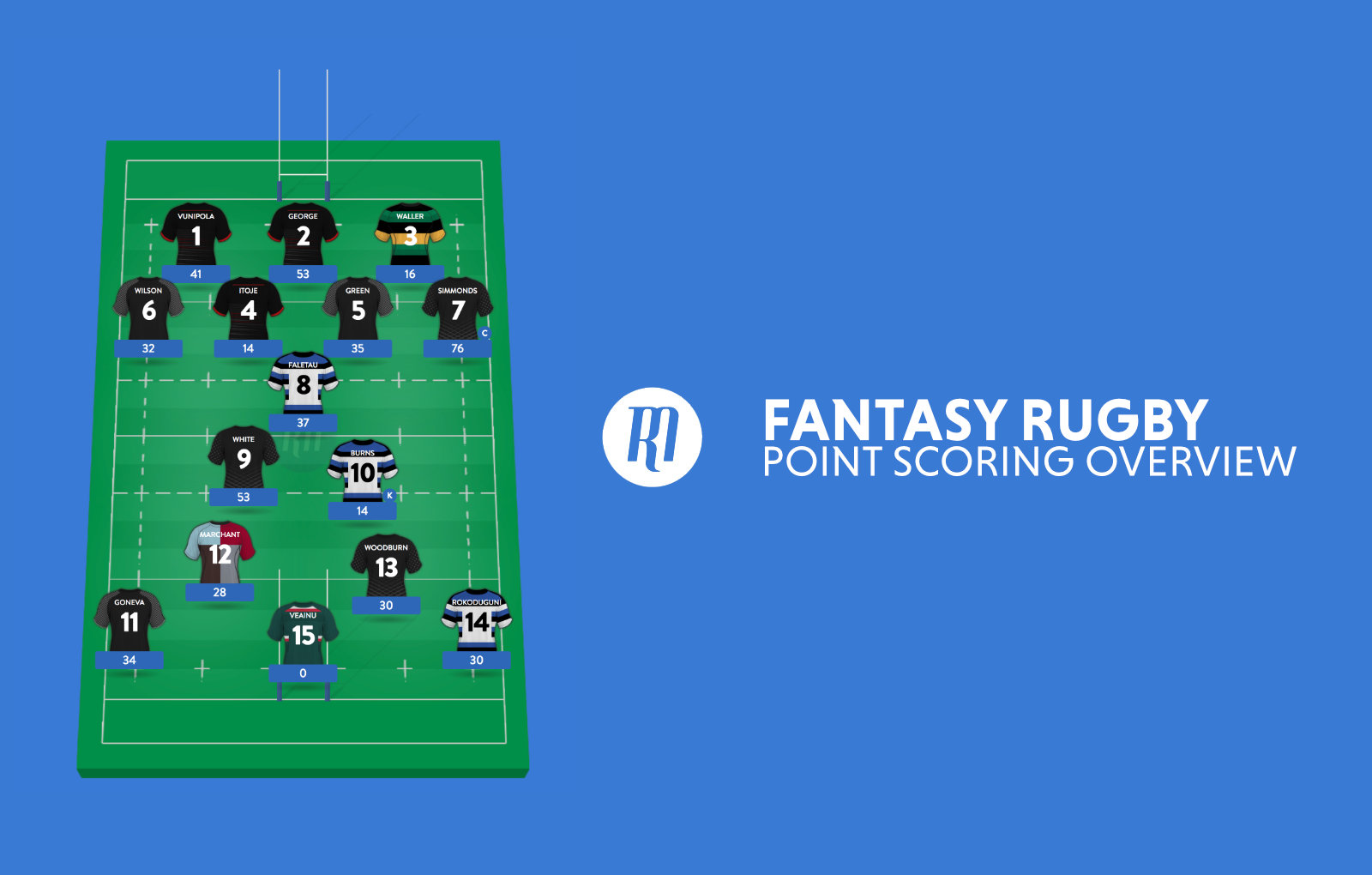Fantasy Rugby: How are points scored?
One of the key aspects to a fantasy rugby platform is how a player earns points for your team, and this article will show you how ours are assigned.
Playing fantasy rugby introduces you to a whole new way of watching the game. While you might support a particular team, the excitement when one of your chosen props goes on a fifty metre run to score under the sticks can deliver just the same thrill.
This is all dependent on a good points scoring system though, and we've worked hard to make sure ours is as balanced and reflective of the game we love as possible.
One of the key aims we set out with, was to ensure that each player on your team is as required as any other; no bias to high scoring wingers or packing your midfield with kickers. To that end, we've balanced out how certain points are attributed to certain positions. This is based on how often a given player performs a particular task. In the first instance, points are awarded differently for metres made, such that backs will get 1 point for every 10 metres made, hookers and backrow will earn 1 point for every 8 metres, locks 1 for every 2m and then props 1 point per metre. Of course, this does put an emphasis on props who are generally big ball carriers, and as last season showed, a long run in for a prop can earn serious points, though it doesn't happen too often.
Passes and offloads fall under the same approach as metres made, with backs earning 1 points for every 5 passes or offloads, hookers and back rows getting 1 for every 3, and props and locks getting a point for every 2. It's also worth us emphasising at this stage that where points are earned based on position, it is the player's position on the field that dictates how these are earned, and not the position of the player in your team. Should a player change position during a game, it is their original position that against which their points are scored.
We've kept a reasonably traditional fantasy approach to the base scoring of the game by attributing 10 points to a try, 5 to a try assist (though the attribution of the assist rests with our data providers who are used by clubs themselves; we were keen to keep decisions like this with third party arbitrators!), 1 point for a conversion, 2 for a penalty and then 3 for a drop-goal. It is worth noting at this point, that only your designated kicker can earn points for penalties and conversions (while any player can earn points for drop-goals).
In the instance that you have a player who kicks at goal for their club but is not selected as your designated kicker, you will see a discrepancy between the points they earn on the field, and the points awarded to the player for your team.
Yellow and red also follow the fantasy tradition, with yellow earning -3 points, and a red getting -10. That said, we've tried to expand discipline as a whole so that it reflects the game, and players also earn minus points for conceding penalties (-2) and turnovers (-1).
Lineouts also get a look in, with both the thrower and receiver earning a point for a completed lineout. Furthermore, a player will earn 3 points for stealing a line out against the head, so solid line out jumpers are worth their weight in gold; especially if they are solid runners too.
Rounding out attacking points, players will earn based on the number of clean breaks they make, and the number of defenders they beat, being awarded one point for each.
We've also tried to reflect the defensive aspects of the game, and while we all love flowing attacking rugby, a great deal of time and effort is put into defence, and so it should be in fantasy. Players earn a point for every tackle they make (though they get -2 for each missed tackle), and should they complete the game with a 100% tackle success, they will earn a further 5 points. Players also get points for others areas of defence, especially their ability to read the game, with 3 points being awarded for both turnovers won, and interceptions.
Finally, players will earn 4 points if they complete 60 minutes in a match, and one point for anything less.
Your team
In how these points are applied to your team, we have in some ways gone against the traditional approach to fantasy games, not least that your bench also earns points for your team, albeit half points. We did this to reflect to the fact that the entire team of 23 invariably gets onto the field of play, but don't worry, we've still got automatic substitutions, so if a player pulls out before a game kicks off, you still have a player earning full points.
You also get to choose a captain for your team, who will earn double points. One might think that this should always be your kicker as they are always guaranteed points, and while this might be true of Damian MacKenzie if you are playing Super Rugby, do not be fooled into thinking the same is true in any other competition. Last year, the spread of high scores fell across all positions, and it is up to you to choose wisely for the upcoming gameweek.
Points are obvious the foundation stone upon which a fantasy game is built, and with the knowledge gleaned from the writing above, you should be able to build a very strong squad capable of competing over the course of the season.
Please do get in touch if you have any questions, otherwise good luck for the season!

Filed under:
Gallagher Premiership, The Scout
Written by: Edward Kerr
Follow: @edwardrkerr · @therugbymag
